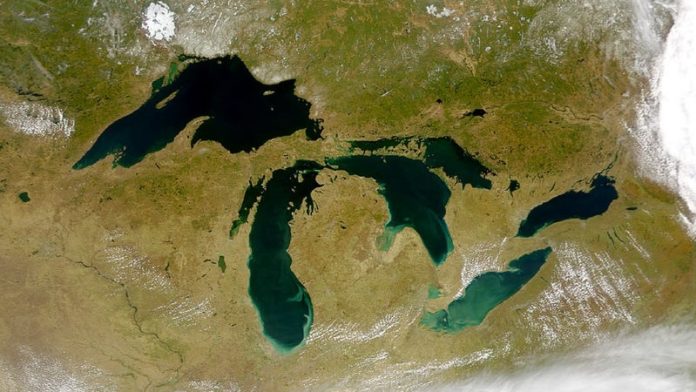The Great Lakes have witnessed temperature spikes of up to three degrees in recent months, and while this may be a delight for swimmers, environmental scientists have sobering words for anyone who thinks 3oC isn’t a big deal.
CBC interviewed the University of Windsor’s Aaron Fisk (full interview below), a professor at the Great Lakes Institute for Environmental Research, about the situation. He mentioned that the annual variation in temperature for the Great Lakes is typically ~0.2oC, and 3oC is much beyond what has been observed over the last 80 years or so.
“We have a system of temperature loggers and buoys throughout the Great Lakes…we collect that data for a whole bunch of reasons,” says Fisk. “The most important part is for climate models. All that data is tracked and archived and followed.”
Delicate equilibrium of lake life is threatened
Such a sudden rise will have implications for the delicate balance of both aquatic and terrestrial life in and around these lakes.
“Temperature is one of the most important drivers of aquatic systems and terrestrial systems as well,” adds Fisk. “It sets up the types of animals you can have there. Animals and fish like a particular temperature. They have evolved to live in that temperature.”
Lakeshore-dwelling creatures such as bass may be particularly vulnerable, with higher temperatures driving a higher metabolism, and their increased appetite could act as a stressor for the broader ecosystem. Meanwhile, other creatures may be forced to move elsewhere to survive.
Another issue is the favourable conditions that warmer waters bring for harmful algal blooms. Fisk notes that we’ve come along way since the 1950s and ’60s when pollution and other factors led to vast areas of toxic green slime (Lake Erie is ‘dead’), but this raises the risk of the blooms returning.
As for the swimmers, the warm waters also increase the likelihood of an E. coli breakout, so don’t get too excited.
Reversing the damage may be out of our control
While ecosystems are under threat, recreational and commercial fishers are experiencing a boom, albeit only a temporary one.
“We have a very large recreational and commercial fishery worth hundreds of millions of dollars,” says Fisk. “The trends we’re seeing and [reproduction rates] are good right now, but it’s a little out of whack with what we know historically with that system. It may be wearing down the system and there may be problems down the line.”
In his concluding remarks, Fisk expressed doubt about our ability to reverse what is happening, pointing out that climate change is a global phenomenon and there’s only so much that can be done on a local level.
Although he encourages further action on climate change, Fisk admits that “I don’t know what we can do in the Great Lakes to mitigate this… it’s almost beyond the region.”
“I am worried, and I’m an optimist,” he adds. “We’re already living with the ramifications of climate change.”








































